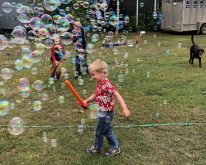Elaine writes: In so many of the families we coach, we see communication breakdowns leading to escalation of conflicts. In some cases, using strategies that provide family members with the tools they need to have better communication can help — but in many cases a relationship between family members has broken down to the point where tools and strategies do not make any sense to use. In these situations, it is important to look at the relationship first and consider what factors are impacting the bond that the two family members in conflict have had or are attempting to hold onto.
According to my coaching teammate Kalynn Spain, poor communication often begins with a poor connection between parent and child. Here are her insights on how communication often improves when we start with connection:
Pants, power and parenting
Read Also

Cereal lodging isn’t just a nitrogen problem
Lack of copper in the soil can also lead wheat and other cereal crops to lodge during wet seasons on the Canadian Prairies.
“My daughter, pantless and sitting in a pile of clean laundry, is yelling at me from the living room while I stand in the kitchen over a hot frying pan. She is making claims her four-year-old brain does not fully understand, such as ‘You’re the stupidest mom I ever seen!’ after I asked her to get dressed before breakfast. With my hungry two-year-old son playing at my feet waiting to eat, I call out to my daughter hoping to motivate her. ‘Breakfast is almost ready!’ She yells back with another comical threat, ‘I’m never going to eat again!’ Back and forth we go without any progress with the pants, until I have a chance to turn off the stove and go over to her. I sit on the floor next to the laundry pile. The pants she chose to wear for the day lay beside her, tempting me to just put them on her with coercion. Instead of force, I choose connection. ‘Hey sweetie, how’s it going? You seem upset. Do you need a hug?’ Her furrowed brow softens and finally a quiet voice comes out. ‘I need your help,’ she says.”
There are many books and speakers telling us how to become better parents. My social media feed is flooded with strategies and tips on how to approach our children’s challenging behaviours. The one author I continue to turn to over and over is Dr. Gordon Neufeld, a psychologist who specializes in attachment theory and its application to raising children and youth.
Pioneered by British psychiatrist John Bowlby in the early 1900s, attachment theory is a lens through which to look at how secure we feel in relationships based on how our physical and emotional needs were met as children. By understanding how we were raised and what our attachment style is, we can better understand how to relate to and communicate with others.
In his TEDx Talk entitled “Relationship Matters,” Dr. Neufeld notes “we long for togetherness… we are creatures of attachment” and that discipline strategies which push children away (think of time-outs) only create more stress for them instinctually. Continuing about how parents struggle to maintain authority over their children, he notes “our natural power derives from one source only: their relationship to us.”
In his book Hold On to Your Kids: Why Parents Need to Matter More Than Peers, Dr. Neufeld explains that finding ways to create and maintain a connection with our children will help us guide them through life. “Connection is the source of our parenting power and influence,” he writes in his chapter on discipline. He coins the phrase “connection before direction” to explain how using attachment can help a parent gain the child’s attention and respect before he or she will follow an instruction.
How powerful is that? Can the bond nature created empower us to gain respect from our children? How does this play out when children become adults and we work alongside each other on the farm?
Strength in security
When I think about how connection (or lack thereof) affects relationships, I recall working with a family in Ontario where the father and son were in high conflict with each other. Over the span of two years, their farming relationship was breaking down and both parties were thinking about what alternatives to working together would look like. Communication was poor. The father would say to me, “He doesn’t listen to me. If he would only listen then maybe we would get somewhere” and then in a separate meeting I would hear the son say, “I’m just so frustrated. The things I say are ignored. And when something goes wrong, it’s always my fault,” adding that his dad would often blame and shame him if he asked questions or if something went wrong.
What the father was failing to understand was that the son needed to feel safe enough to ask questions and learn from him without being shamed. Doing so would restore their attachment and increase the son’s motivation to respect the father’s natural authority as the parent. Through several family meetings, with their wives there for support, the father discovered the son did not feel trusted by him. The son shared he needed more grace and patience from the father in moments where he was trying to learn. The two couples set aside specific meeting times where the son and his wife could ask questions of his parents about the operation and give ideas that could be considered for the future.
We can learn a lot from how nature intends us to further our relationships — connection first. How we each connect with others, especially our parents, depends on many variables including our cultural backgrounds, external stressors impacting our mental health, and our unique personal styles. It’s important to recognize each person may need something different to feel safe and secure in his or her attachment. My hope for farm families is that they recognize communication can only improve when we start with connection.
















